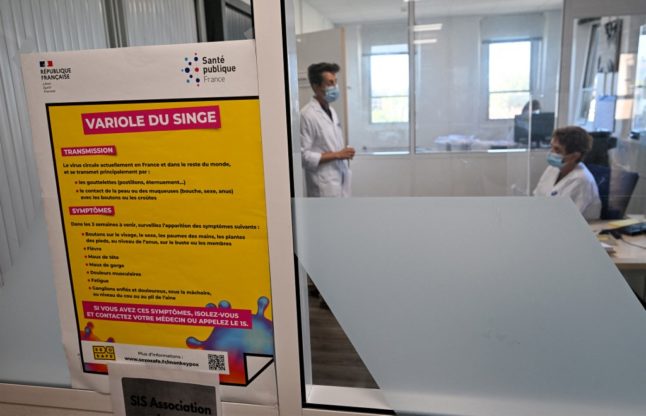“You do not come out unscathed from a disease that has hurt you so much… as well as the additional burden of discrimination,” said Corentin Hennebert, one of the first cases in France.
Since May the virus has rapidly spread across the world, overwhelmingly among men who have sex with men, provoking fears of a repeat of the stigma faced by gay men seen during the AIDS epidemic.
Nathan Peiffer-Smadja, an infectious disease specialist at the Bichat-Claude Bernard Hospital in Paris, who has coordinated research on monkeypox patients, said the “psychological distress is linked to several aspects” of the disease.
Monkeypox can be very painful, particularly due to lesions which commonly appear on the genitals, anus or face.
READ ALSO Who is eligible for the monkeypox vaccine in France?
The “after-effects, particularly aesthetic”, are distressing for many who fear they could be left with long-lasting scars, Peiffer-Smadja said.
Then there is the impact of being suddenly hit by “a disease people had never heard of” after two years of the Covid pandemic, with the three-week monkeypox isolation period reviving bad memories of lockdowns.
A small number of patients can develop internal lesions, particularly inside the anus, which can be “extremely painful”, Peiffer-Smadja said.
That was unfortunately the cases for Hennebert.
“I constantly had the impression that razor blades were being thrust into me – I can’t think of any other comparison, (the pain) was so strong,” the 27-year-old told AFP.
Before he was given the powerful painkiller tramadol, he lost seven kilos in just three days because he was not eating.
“All I could think about was the pain,” he said.
“And I’m not the only one, others have contacted me to tell that they were at the end of their tether, that they were crying all the time.”
After recovering, Hennebert went on to become the spokesman for a group of monkeypox patients demanding swifter action against the disease.
Sebastien Tuller, a 32-year-old LGBT activist, said he was “very anxious” when monkeypox lesions began to appear on his face.
“It was really ugly and I didn’t know what to do,” he said.
Michel Ohayon, head of the Paris sexual health centre 190, said that “as soon as a disease is visible, it is frightening because it becomes potentially stigmatising.”
He compared the monkeypox lesions to those from kaposi sarcoma cancer, a visible “symptom of AIDS”.
The global monkeypox outbreak has “reawakened the trauma of HIV” despite the disease being far less deadly, said Nicolas Derche of the French LGBT group SOS.
“For HIV-positive people, this has revived some very rough things,” from fear of a diagnosis to reliving past discrimination, said Vincent Leclercq of the French group AIDES.
Tuller said he received a torrent of insults and derogatory comments when he went public about having monkeypox.
“There is a lot of residual homophobia and this has a real impact on mental health,” he said.
“Many don’t say they have – or have had – monkeypox, fearing being stigmatised,” he added.
Young people who have not yet come out are put in a particularly difficult position, as are those afraid of having their sexual orientation revealed to their employer because they have to isolate for three weeks, he said.
Nearly a quarter of the calls to a French monkeypox helpline this month were about psychological issues, the group that manages the line told AFP.
Some gay men have avoided any sexual activity for months out of fear of the disease, further impacting mental health, LGBT groups said.
France has been at the forefront of the vaccination campaign for monkeypox, vaccinating more than 50,000 people so far and offering the vaccine to a relatively wide group of at-risk people.
Recently vaccination centres close to the border have seen an influx of people travelling from Belgium, Switzerland, Italy and Spain, where vaccination policies are more restrictive and supplies of the vaccine lower.



 Please whitelist us to continue reading.
Please whitelist us to continue reading.
Member comments